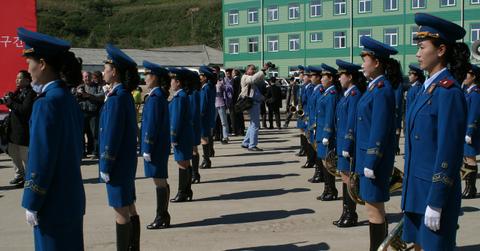North Korea Turns To Solar Power To Keep Citizens In the Light
One of the larger cities in North Korea, Chongjin, has seen the spawning of solar panels throughout their community. Mostly used by authority figures, their use has now trickled down to regular citizens that can import a system from China.
Updated May 26 2019, 7:44 p.m. ET
Not often do we get a glimpse at what’s happening inside of North Korea, but apparently they’re embracing the advancement of solar-powered technology. Raw footage from the Unification Media Group reveals what life is like in one of the country’s biggest cities, Chongjin. One unique aspect is residents turning to solar energy.
In the short clip, solar panels have been installed on tall poles right outside of multiple resident homes. The video suggests they’re imported from China, a country that’s truly embracing renewable energy. China currently hosts the world’s biggest floating solar farm (soon to be trumped by Singapore) and they’ve cancelled over 100 coal-fired power plants.
At first, people may expect something like this to be heavily restricted, considering North Korea reportedly regulates specific hair styles, limits television viewing, and changes rules in basketball. Indeed, at the beginning, mostly high-ranking officials had solar panels, but an inside source noted in the video says more citizens have been putting them up recently.
“Even just a few years ago, you really only saw solar panels installed on the private homes of high ranking officials and on the buildings of premium factories and trading companies. Now, the popularity of solar panels has shot upwards. In some areas, as many as 30-40 percent of families have them installed on their homes.”
According to the Daily NK, residents can install anywhere from 10 to 100 watts of solar capacity, the latter being up to $116 USD. That’s an extremely high cost for North Korean citizens, so most of them go for the 30-watt solar array for around $35 USD. For perspective, Julie Makinen at The Los Angeles Times explains that $35 USD is about one month's wages for the average factory worker in North Korea. Of course, the closer people are to the Sino-Korean border, the cheaper installing solar panels become as that’s where the product is imported from.
Most of these residents use solar panels to charge up batteries for their appliances, such as cell phones or media players. Expectedly, that’s risen the amount of device sales in North Korea. Originally running on 220-volt appliances, the entire country has made the switch to 12-volt products. Commonly, portable appliances like radios, rice cookers, coffee makers, and small refrigerators use 12 volts.
These solar panels also help out with blackouts in the area. North Korea has suffered from electricity blackouts at night for years, reportedly because the country's electricity source is too small to manage the entire country's needs. For many years, hydroelectric plants have been constructed to fix this issue, but all the generated electricity was first sent to Pyongyang, North Korea’s capital, before being distributed to other areas. According to Daily NK’s source in the North Hamgyong Province, “food and energy problems are being solved by the markets.”
The Unification Media Group has been producing and transmitting radio broadcasts in North Korea. They’re asking for donations and hoping that they can build a new future for citizens that know more about the world outside of their country. The good news is renewable energy being more commonplace in itself can give residents living there a bit more freedom.
